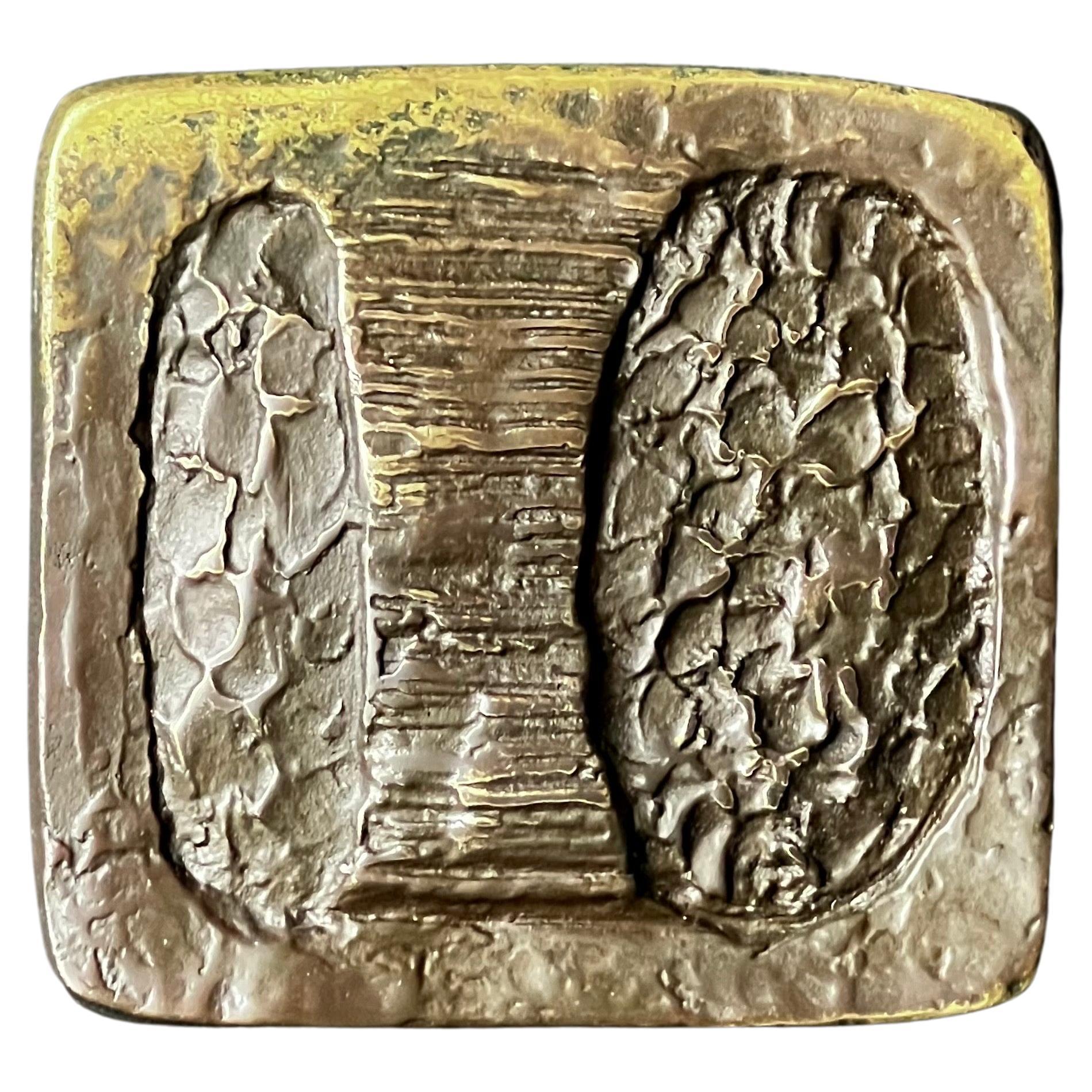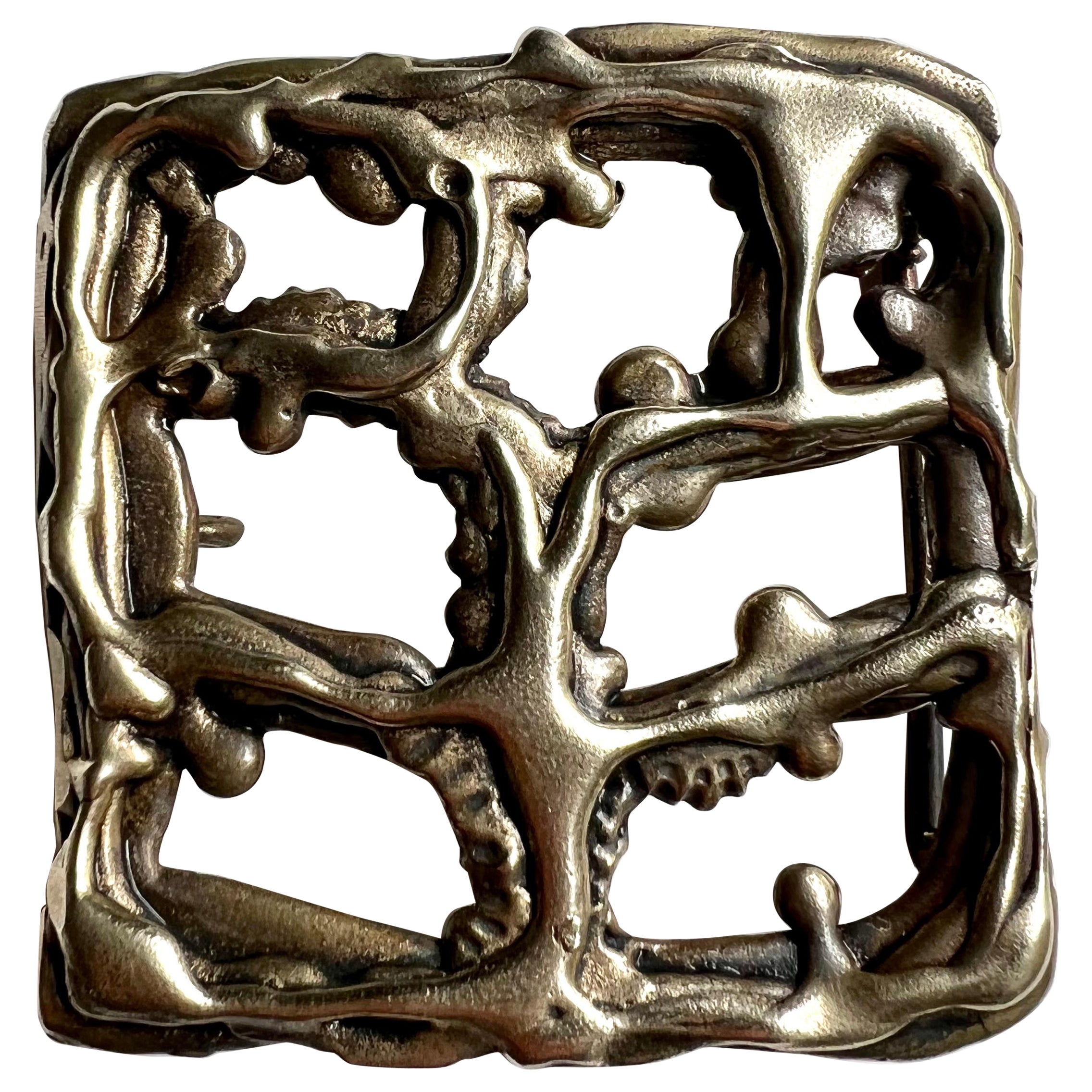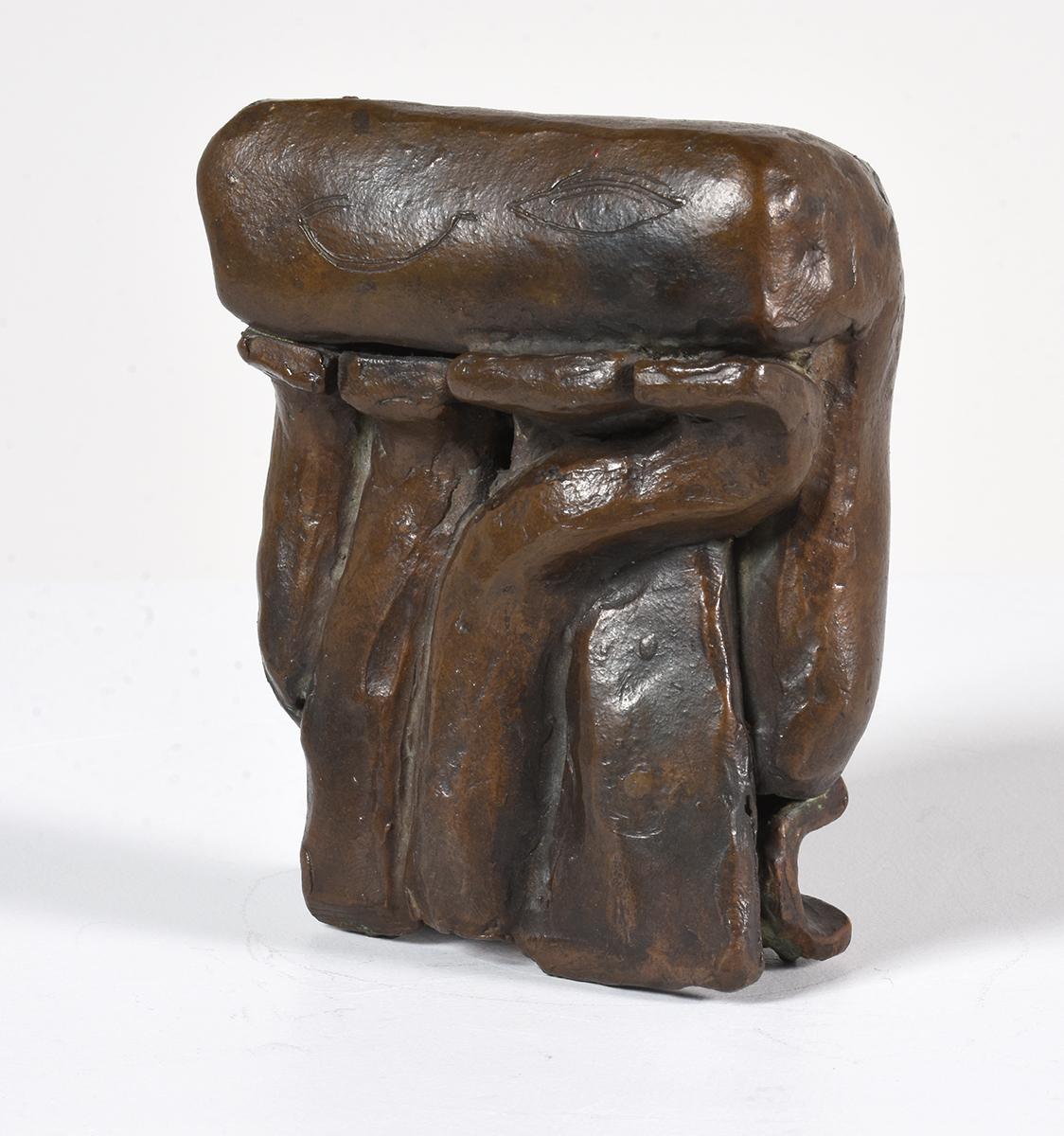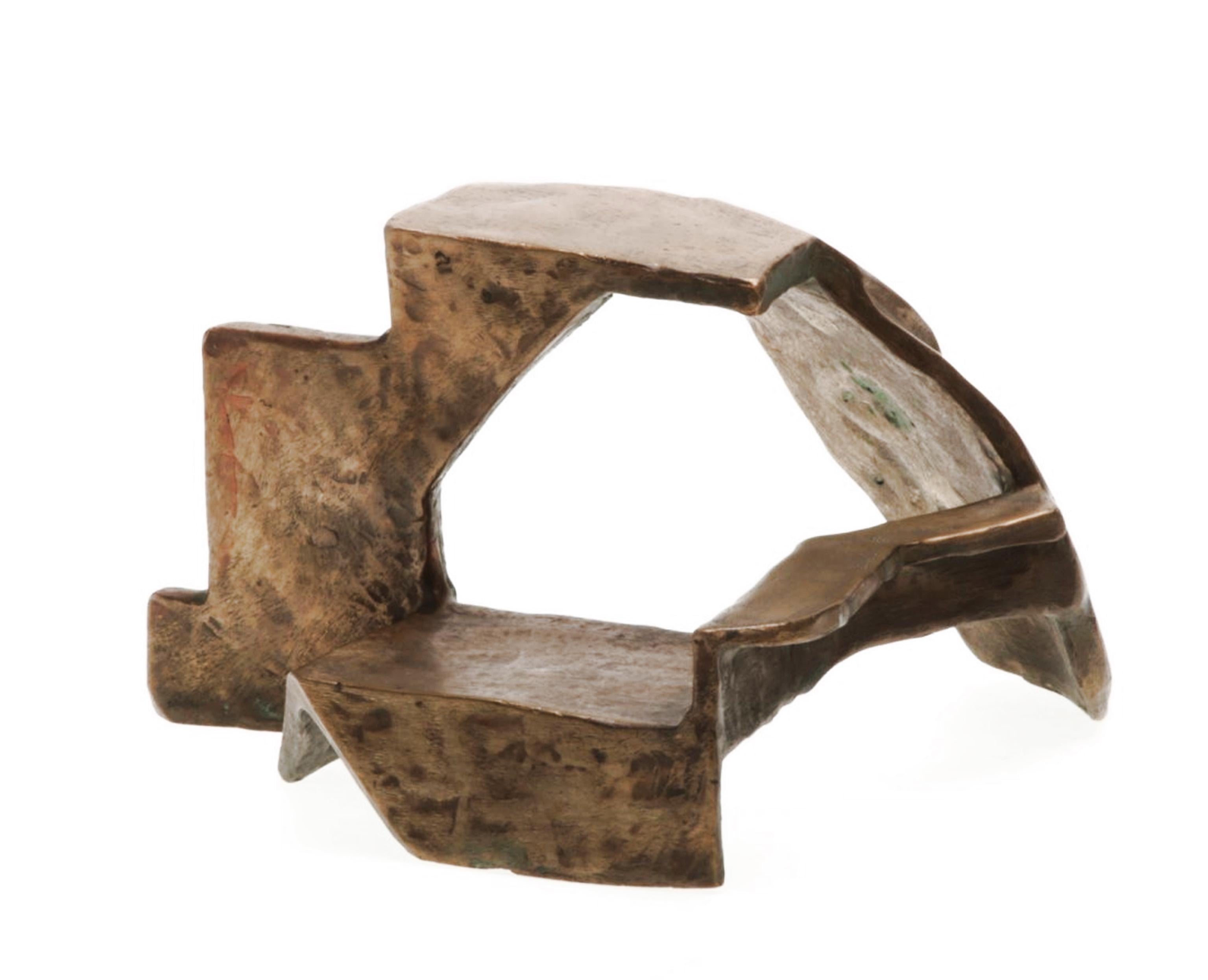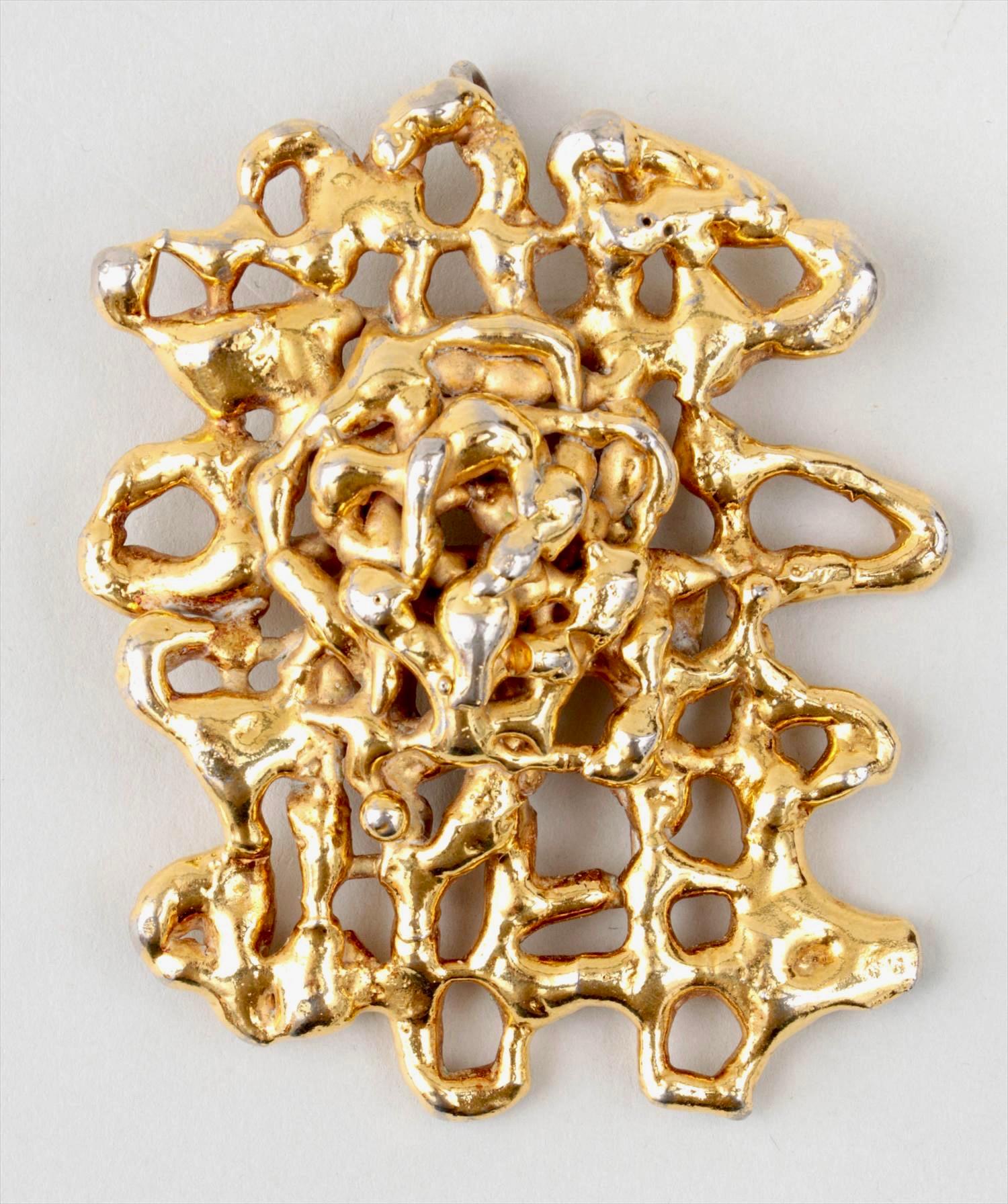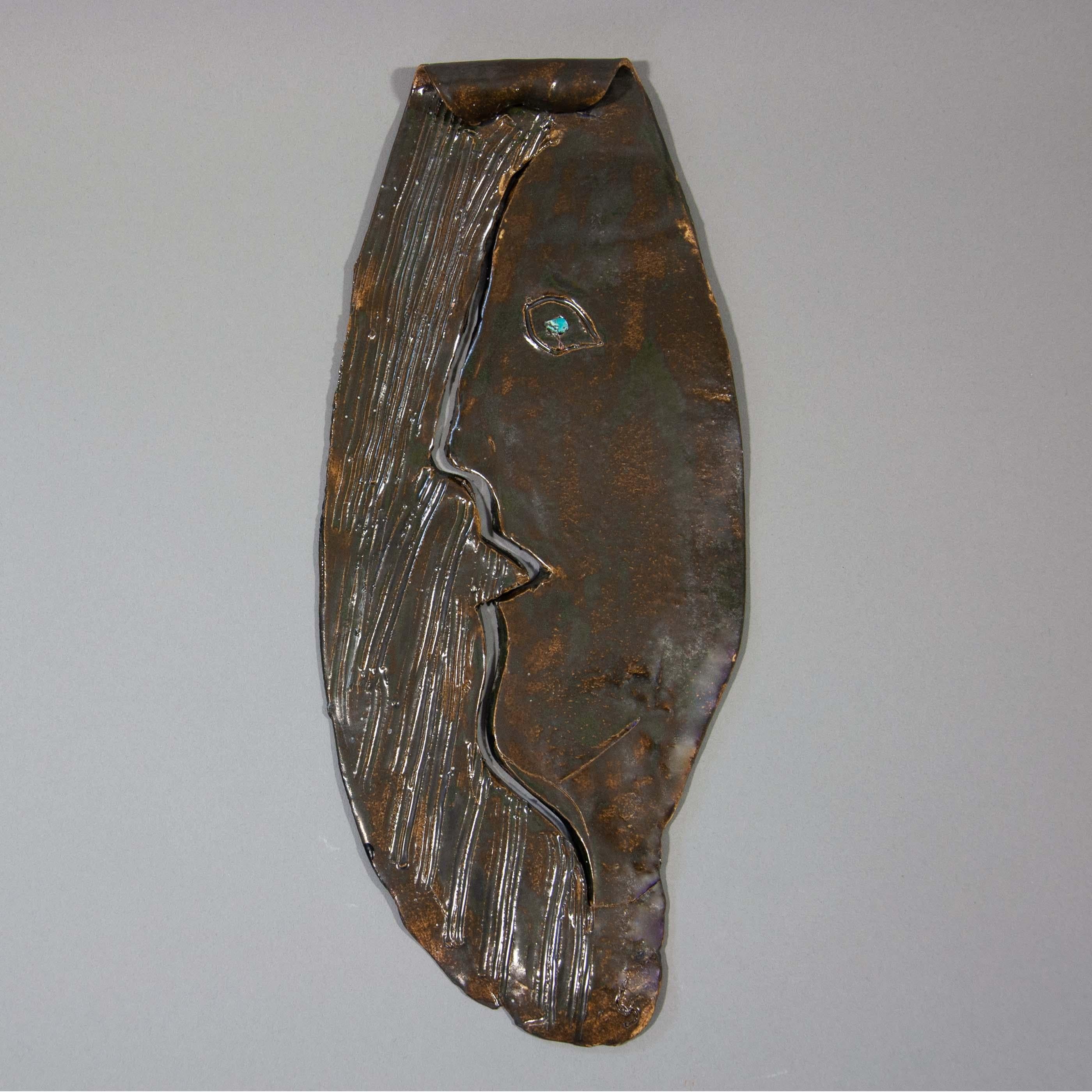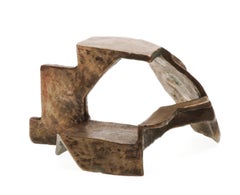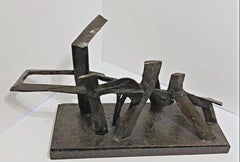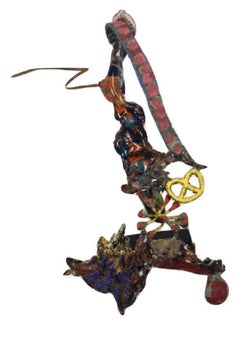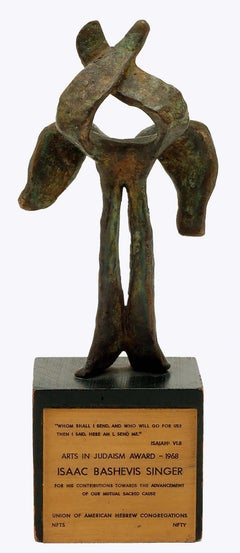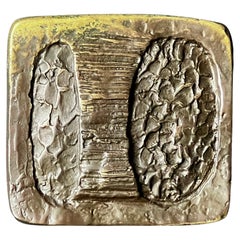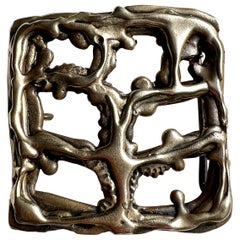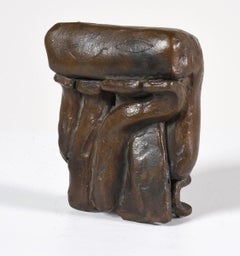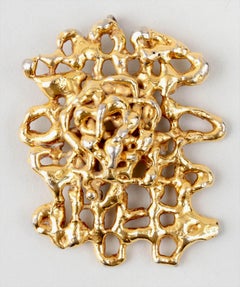Items Similar to Bronze Belt Buckle, limited edition, in collection of Victoria & Albrt Museum UK
Want more images or videos?
Request additional images or videos from the seller
1 of 4
Anthony CaroBronze Belt Buckle, limited edition, in collection of Victoria & Albrt Museum UK1993
1993
$2,500
£1,915.95
€2,202.04
CA$3,511.37
A$3,929.87
CHF 2,057.15
MX$47,740.85
NOK 26,120.56
SEK 24,649.21
DKK 16,431.13
About the Item
Anthony Caro
Bronze Belt Buckle, 1993
Bronze sculpted belt buckle. Stamped on the verso
3 × 4 1/2 inches
Exhibition History:
Victoria and Albert Museum, London, England (another edition)
Provenance:
MOMART, London, England
The present art work is an original bronze sculpture - a sculpted belt buckle, designed by famous British sculptor Sir Anthony Caro." It features the stamped text "MOMART Christmas 1993" on the verso. Today these works are collectors items and can sell for thousands of dollars. Very cool, valuable and collectible! Unnumbered, but issued in an edition of 500. Momart is a British company specialising in the storage, transportation, and installation of works of art. Today, the company is best known for two things: its annual artist Christmas gift, created by the most important British artists in the world, as well as, more notoriously, a 2004 warehouse fire that destroyed irreplaceable art works including Tracey Emin's famous "Everyone I Have Ever Slept With". Momart's clients include the Royal Academy of Arts, Victoria & Albert Museum, National Gallery, Tate Modern, Tate Britain and Buckingham Palace. The tradition of the Momart "Christmas Card" (an original artwork, not a card) goes back to 1984 when the first object – a festive card – was designed for the company by Bruce McLean. Since then Momart collaborated on this project with many of the top British and international artists. The complete series of Momart Christmas gifts is now part of the permanent collections of the Victoria and Albert Museum and the Tate.
- Creator:Anthony Caro (1924, British)
- Creation Year:1993
- Dimensions:Height: 3 in (7.62 cm)Width: 4.5 in (11.43 cm)
- Medium:
- Movement & Style:
- Period:
- Condition:
- Gallery Location:New York, NY
- Reference Number:1stDibs: LU1745212683992
About the Seller
5.0
Platinum Seller
Premium sellers with a 4.7+ rating and 24-hour response times
Established in 2007
1stDibs seller since 2022
444 sales on 1stDibs
Typical response time: 2 hours
- ShippingRetrieving quote...Shipping from: New York, NY
- Return Policy
Authenticity Guarantee
In the unlikely event there’s an issue with an item’s authenticity, contact us within 1 year for a full refund. DetailsMoney-Back Guarantee
If your item is not as described, is damaged in transit, or does not arrive, contact us within 7 days for a full refund. Details24-Hour Cancellation
You have a 24-hour grace period in which to reconsider your purchase, with no questions asked.Vetted Professional Sellers
Our world-class sellers must adhere to strict standards for service and quality, maintaining the integrity of our listings.Price-Match Guarantee
If you find that a seller listed the same item for a lower price elsewhere, we’ll match it.Trusted Global Delivery
Our best-in-class carrier network provides specialized shipping options worldwide, including custom delivery.More From This Seller
View AllAbstract Bronze Sculpture, Unique Signed work from the estate of Arthur Carr
By Peter Reginato
Located in New York, NY
Peter Reginato
Abstract Bronze Sculpture, ca. 1987
Bronze
Signed on the underside
4 × 6 1/2 × 5 1/2 inches
This bronze sculpture is by the American abstract sculptor Peter Reginato. ...
Category
1980s Abstract Abstract Sculptures
Materials
Bronze
Uxmal, unique bronze sculpture by Greek-American sculptor and Harvard professor
Located in New York, NY
Dimitri Hadzi
Uxmal, 1991
Cast bronze on custom made granite base
17 × 30 1/2 × 14 inches
The title UXMAL, refers to the ancient Mayan city of Uxmal, which is known for its "Pyramid of the Magician"
Provenance:
Acquired by the original owner from the prestigious Gremillion Gallery in Houston, Texas (accompanied by a copy of the original receipt)
Measurements:
Base:
26.5 by 11 by 1.75 inches
Work longest
30.5 inches
Widest 14 inches
Highest. 17 inches
More about Dimitri Hadzi"
Derived from the figure and mythic narratives, Hadzi’s sculpture references antiquity and classical artifacts – abstracted anatomical forms, columnar and other architectural elements, helmets, weaponry and body armor function as visual metaphors for ancient cultures. “I was interested in mythology, and I was interested in movement,” Hadzi remarked on his years in Rome, “I was attempting through formal methods to exaggerate sexual tension or apprehension. Suddenly I was myself in an atmosphere of freedom.” [1] Powerfully rendered in bronze his sculptures convey raw emotion, brute strength and mass, tempered with a delicate rush of whimsy, vivacity and sensuality.
Born in New York City on March 21, 1921, Hadzi graduated from Cooper Union in 1950 and received a Fulbright Fellowship in the same year. After studying sculpture in Greece, he moved to Rome under the GI Bill where he lived for twenty-five years. Hadzi returned to the U.S. where he taught at Harvard University for fourteen years. He continued to create sculpture until his death in 2006.
Hadzi is included in the permanent collections of the Museum of Modern Art; the Whitney Museum of American Art; the Museum of Fine Arts, Boston; the Hirshhorn Museum and Sculpture Garden; The Phillips Collection and the Guggenheim Museum. Receiving over twenty sculpture commissions, Hadzi’s work appears in public squares, concert halls, federal and private plazas, and universities throughout the world.
---------------
[1] Elsen, Albert. “On Artistic Freedom: An Interview,” Dimitri Hadzi, (New York: Hudson Hills Press, 1996), 30.
Additional Biography:
Dimitri Hadzi (1921 – 2006) is among the most distinguished modernist sculptors, creator of works in bronze and stone that are powerfully abstract and expressionist in character. His contribution to the international language of sculpture continues to influence and inspire through permanent installations and collections, and exhibitions worldwide.
Born to Greek-American immigrant parents in New York City, he had a talent for drawing at an early age and won a prize for his young ability. But, it wasn't until after serving in the Air-force in the South Pacific during WWII that he turned his sights fully to painting and sculpture, going on to study both at Cooper Union. Eventually, he would become a mainstay of the Cambridge, MA art community. He was a Guggenheim Fellow (1957), the winner of the Venice Biennale Award (1962), and the Rome Prize (1974).
His most notable sculptures are: Copley Place Waterfall (Boston, MA), Owen Glass Co. (Toledo, OH), as well as Thermopolis, adjacent to Boston’s City Hall Plaza, and the former Omphalos in Harvard Square (Cambridge, MA).
Hadzi is included in the permanent collections of the Museum of Modern Art; National Gallery of Art; Whitney Museum of American Art; Museum of Fine Art, Boston; Hirshhorn Museum and Sculpture Garden; The Phillips Collection and the Guggenheim Museum.
Additionally, Hadzi was also a prolific painter, and printmaker. He also taught at Harvard University for over a decade. Famously, David Hockney attended one of Hadzi’s classes at the Carpenter Center at Harvard, where Hadzi served as director. The two of them spent time together painting and discussing techniques. Hockney gifted Hadzi one of his paintings.
He worked alongside his good friend, Nobel Prize winning Irish poet...
Category
1990s Abstract Abstract Sculptures
Materials
Granite, Bronze
Famed sculptor Nancy Graves unique signed patinated bronze sculpture NY Award
By Nancy Graves
Located in New York, NY
Nancy Graves
New York State Governor's Arts Award, 1988
Bronze, polychrome patina and baked enamel on base with Award plaque
10 1/4 × 7 × 10 1/4 inches
Hand signed and dated with inc...
Category
1980s Abstract Expressionist Abstract Sculptures
Materials
Bronze, Enamel
Bronze Sculpture to Isaac Bashevis Singer, Arts in Judaism Award signed Judaica
By Nathaniel Kaz
Located in New York, NY
Nathaniel Kaz
Bronze Sculpture to Isaac Bashevis Singer for Arts in Judaism Award, 1966
Bronze, Square wooden base, Metal tag
Signed and dated "66" to back of bronze portion of the w...
Category
1960s Abstract Expressionist Abstract Sculptures
Materials
Metal, Bronze
The Promise, original signed bronze sculpture by renowned British - US sculptor
Located in New York, NY
William Tucker
The Promise, ca. 1980
Bronze
Signed and numbered 5/6 - incised on the metal
2 5/8 × 8 5/8 × 1 inch
This abstract sculpture is by the renowned modern British born sculp...
Category
1980s Abstract Abstract Sculptures
Materials
Bronze
Welded Brushed Steel Sculpture - geometric abstraction (Unique, signed)
By Michael Todd
Located in New York, NY
Michael Todd
Welded Brushed Steel Sculpture - geometric abstraction, 1968
Welded Brushed Steel
Hand signed and dated 1968 in marker on surface....
Category
1960s Abstract Geometric Abstract Sculptures
Materials
Steel
You May Also Like
Sculptural Bronze Door Handle with Abstract Design
Located in London, GB
A sculptural bronze push or pull door handle with abstract relief. Germany, second half 20th century (probably 1970s).
A heavy piece, made of cast metal, with very nice changing ton...
Category
Late 20th Century German Mid-Century Modern Architectural Elements
Materials
Bronze
Sculptural Brutalist Brass Belt Buckle
Located in Los Angeles, CA
A very unique Brutalist brass belt buckle. Unique and one of a kind, this buckle will stand out and make a statement. In the Brutalist style, a wonde...
Category
20th Century Collectible Jewelry
Materials
Metal
Eugene Caples "Bronze Sculpture I" Abstract Bronze Sculpture
By Eugene Caples
Located in Detroit, MI
This small exquisite "Bronze Sculpture I" is in excellent condition and a perfect example of Eugene Caples craftsmanship. Although it is mainly abstract, there are bits that look figurative either an arm or a leg attempting to emerge from a fold or attempting to hold a pose such as in yoga. It cries out to be touched and held, looked at and caressed. The beautiful patina on the surface gives voice to the many hands that have done these things.
Eugene Caples is a designer and craftsman who worked in Kansas City in the 1960s and later through the early 21st century. He attended the Kansas City Art Institute, earning his Bachelors of Fine Arts in Industrial Design in 1959. In 1963 he was accepted to Cranbrook Academy of Art, Bloomfield Hills, Michigan. The Cranbrook Academy of Art was designed by architect and faculty member, Eliel Saarinen who collaborated with Charles and Ray Eames on chair and furniture design. Numerous creative artists are alumni of Cranbrook and include: Harry Bertoia, Florence Knoll, Jack Lenor Larsen, Donald Lipski, Duane Hanson, Nick Cave, Hani Rashid, George Nelson, Urban Jupena (Nationally recognized fiber artist), Artis Lane (the first African-American artist to have her sculpture, "Sojourner Truth," commissioned for the Emancipation Hall in the Capital Visitor Center in Washington DC), Cory Puhlman (televised Pastry Chef extraordinaire), Thom O’Connor (Lithographs), and Paul Evans (Created Brutalist-inspired sculpted metal furnishings.)
Gene worked...
Category
Late 20th Century American Modern Abstract Sculptures
Materials
Bronze
Vintage Abstract Expressionist Ibram Lassaw Modernist Bronze Sculpture Pendant
By Ibram Lassaw
Located in Surfside, FL
IBRAM LASSAW
(Russian-American, 1913-2003),
Sculptural pendant
Gold plated bronze
Signed verso
Measurements: 2-7/8''h, 2-1/4''w.
Ibram Lassaw was born in Alexandria, Egypt, of Russian Jewish émigré parents. After briefly living in Marseille, France, Naples, Italy Tunis, Malta, and Constantinople, Turkey his family settled in Brooklyn, New York, in 1921.His family settled in Brooklyn, New York. He became a US citizen in 1928. Ibram Lassaw, one of America's first abstract sculptors, was best known for his open-space welded sculptures of bronze, silver, copper and steel. Drawing from Surrealism, Constructivism, and Cubism, Lassaw pioneered an innovative welding technique that allowed him to create dynamic, intricate, and expressive works in three dimensions. As a result, he was a key force in shaping New York School sculpture.He first studied sculpture in 1926 at the Clay Club and later at the Beaux-Arts Institute of Design in New York. He made abstract paintings and drawings influenced by Kandinsky, Sophie Taeuber Arp, and other artists. He also attended the City College of New York. Lassaw’s encounter with avant-garde art in the International Exhibition of Modern Art (1926), organized by the Société Anonyme at the Brooklyn Museum, made a powerful impression on him. In the early 1930s he explored new materials and notions of open-space sculpture. The ideas of László Moholy-Nagy and Buckminster Fuller were important to him, and he knew the work of Julio González, Pablo Picasso, and the Russian Constructivists. After experimenting with plaster, rubber and wire, Lassaw began working with steel, which became a frequent medium for the artist, along with other metals. His work reflects the influence of Surrealist artists such as Alberto Giacometti and Joan Miro as well as American Modernist Alexander Calder.A pioneer of abstract sculpture in the United States, in 1936 Lassaw was a founding member of the organization American Abstract Artists. Between 1933 and 1942 he worked for various federal arts projects: the Public Works of Art Project, Civil Works Authority, and WPA, the Works Progress Administration Federal Art Project. In 1938 he produced his first welded work. He served with the U.S. Army, where he learned direct welding techniques. During the 1940s he experimented with cage constructions and with acrylic plastics, adding color to his sculptures by applying dye directly to their surfaces. In 1949 Lassaw was a founder of the Club, an informal discussion group of avant-garde artists that had developed from gatherings at his studio, on Eighth Street.
During the mid-1930s, Lassaw worked briefly for the Public Works of Art Project cleaning sculptural monuments around New York City. He subsequently joined the WPA as a teacher and sculptor until he was drafted into the army in 1942. Lassaw's contribution to the advancement of sculptural abstraction went beyond mere formal innovation; his promotion of modernist styles during the 1930s did much to insure the growth of abstract art in the United States. He was one of the founding members of the American Abstract Artists group, and served as president of the American Abstract Artists organization from 1946 to 1949. In 1951, Samuel Kootz invited Lassaw to join his gallery in New York. He also had a summer gallery in Provincetown, MA. Lassaw had been summering in Provincetown since 1944, and in 1951 rented an apartment next door to the Kootz Gallery. Among the artists in the Kootz Gallery were Jean Arp, William Baziotes, Georges Braque, Jean Dubuffet, Herbert Ferber, Arshile Gorky, Adolph Gottlieb, David Hare, Hans Hofmann, Fernand Leger, Georges Mathieu, Joan Miró, Robert Motherwell, Pablo Picasso, Pierre Soulages, and Maurice de Vlaminck. Lassaw is a sculptor who was a part of the New York School of Abstract expressionism during the 1940s and 1950s. Jackson Pollock, Lee Krasner, James Brooks, Willem de Kooning, and several other artists like Lassaw spent summers on the Southern Shore of Long Island. Lassaw spent summers on Long Island from 1955 until he moved there permanently in 1963.
SELECT EXHIBITIONS
1961 International Exhibition of Modern Jewelry 1890–1961, organized by the Worshipful Company of Goldsmiths in association with the Victoria and Albert Museum, London
1967 Exhibition of Jewelry by Painters and Sculptors, organized for circulation by MoMA
1973 Jewelry...
Category
Mid-20th Century Abstract Expressionist Abstract Sculptures
Materials
Gold, Bronze
Face Wall Piece - Bronze, Abstract Sculpture, 2021
By Lois Sattler
Located in Boston, MA
Artist Commentary:
Face Wall Piece - Bronze. Playful curves play against the strength inherent in this bronze face-to-face mask wall hanging glazed in a bronze patina with a turquois...
Category
21st Century and Contemporary Abstract Impressionist Abstract Sculptures
Materials
Ceramic, Porcelain
Eugene Caples "Bronze Sculpture II" Abstract Bronze Sculpture
By Eugene Caples
Located in Detroit, MI
This small exquisite "Bronze Sculpture II" is in excellent condition and a perfect example of Eugene Caples craftsmanship. This is mainly abstract with some graphic or architectural elements and is so delightful that mythical creatures demand to be considered. It cries out to be touched and held, looked at and caressed. The beautiful patina on the surface gives voice to the many hands that have done these things.
Eugene Caples is a designer and craftsman who worked in Kansas City in the 1960s and later through the early 21st century. He attended the Kansas City Art Institute, earning his Bachelors of Fine Arts in Industrial Design in 1959. In 1963 he was accepted to Cranbrook Academy of Art, Bloomfield Hills, Michigan. The Cranbrook Academy of Art was designed by architect and faculty member, Eliel Saarinen who collaborated with Charles and Ray Eames on chair and furniture design. Numerous creative artists are alumni of Cranbrook and include: Harry Bertoia, Florence Knoll, Jack Lenor Larsen, Donald...
Category
Late 20th Century American Modern Abstract Sculptures
Materials
Bronze
